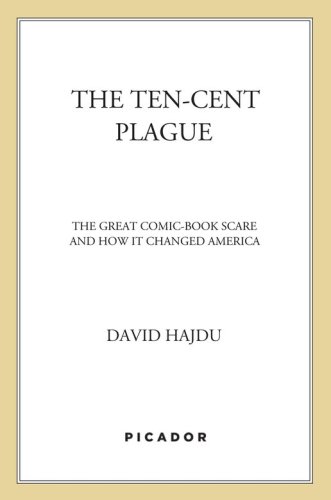
The Ten-Cent Plague
The Great Comic-Book Scare and How It Changed Amer
کتاب های مرتبط
- اطلاعات
- نقد و بررسی
- دیدگاه کاربران
نقد و بررسی

Starred review from December 10, 2007
After writing about the folk scene of the early 1960s in Positively 4th Street
, Hajdu goes back a decade to examine the censorship debate over comic books, casting the controversy as a prelude to the cultural battle over rock music. Fredric Wertham’s Seduction of the Innocent
, the centerpiece of the movement, has been reduced in public memory to a joke—particularly the attack on Batman for its homoeroticism—but Hajdu brings a more nuanced telling of Wertham’s background and shows how his arguments were preceded by others. Yet he comes down hard on the unsound research techniques and sweeping generalizations that led Wertham to conclude that nearly all comic books would inspire antisocial behavior in young readers. There are no real heroes here, only villains and victims; Hajdu turns to the writers and artists whose careers were ruined when censorship and other legal restrictions gutted the comics industry, and young kids who were coerced into participating in book burnings by overzealous parents and teachers. With such a meticulous setup, the history builds slowly but the main attraction—EC Comics publisher Bill Gaines’s attempt to explain in a Senate committee hearing how an illustration of a man holding a severed head could be in “good taste”—holds all the dramatic power it has acquired as it’s been told among fans over the past half-century.

April 28, 2008
This meticulous exploration into comics and the censorship campaigns of the late 1940s and 1950s proves interesting and accessible to even neophytes of comics. Hajdu reveals a complicated and controversial history interlacing public opinion and “research” on the effects of comics by cultural critics such as Sterling North and Frederic Wertham with interviews of artists, publishers and consumers of comics at the time. Stefan Rudnicki's deep gravely voice with its smooth release and pace compliments the sometimes exhaustive Hajdu. However, Rudnicki's quoting voice can be both tiresome and questionable as he instills accents that are not necessarily suggestive from the text, and often they are indistinguishable from other similarly accented voices. Surprisingly, though the topic is highly visual in nature, listeners won't necessarily feel they are missing out on the illustrations and photos in the book. Simultaneous release with the FSG hardcover (Reviews, Dec. 10).

























دیدگاه کاربران